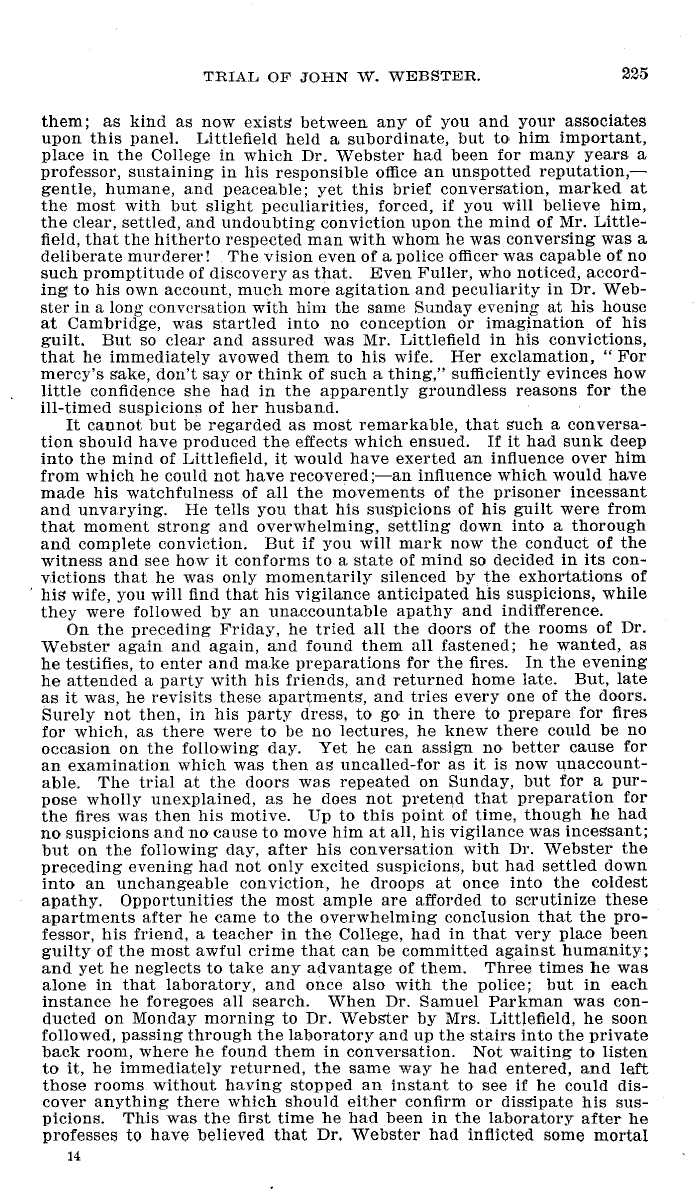|
TRIAL OF JOHN W. WEBSTER. 225
them; as kind as now exists between any of you and your associates
upon this panel. Littlefield held a subordinate, but to him important,
place in the College in which Dr. Webster had been for many years a
professor, sustaining in his responsible office an unspotted reputation,-
gentle, humane, and peaceable; yet this brief conversation, marked at
the most with but slight peculiarities, forced, if you will believe him,
the clear, settled, and undoubting conviction upon the mind of Mr. Little-
field, that the hitherto respected man with whom he was conversing was a
deliberate murderer! The vision even of a police officer was capable of no
such promptitude of discovery as that. Even Fuller, who noticed, accord-
ing to his own account, much more agitation and peculiarity in Dr. Web-
ster in a long conversation with him the same Sunday evening at his house
at Cambridge, was startled into no conception or imagination of his
guilt. But so clear and assured was Mr. Littlefield in his convictions,
that he immediately avowed them to his wife. Her exclamation, " For
mercy's sake, don't say or think of such a thing," sufficiently evinces how
little confidence she had in the apparently groundless reasons for the
ill-timed suspicions of her husband.
It cannot but be regarded as most remarkable, that such a conversa-
tion should have produced the effects which ensued. If it had sunk deep
into the mind of Littlefield, it would have exerted an influence over him
from which he could not have recovered; an influence which would have
made his watchfulness of all the movements of the prisoner incessant
and unvarying. He tells you that his suspicions of his guilt were from
that moment strong and overwhelming, settling down into a thorough
and complete conviction. But if you will mark now the conduct of the
witness and see how it conforms to a state of mind so decided in its con-
victions that he was only momentarily silenced by the exhortations of
his wife, you will find that his vigilance anticipated his suspicions, while
they were followed by an unaccountable apathy and indifference.
On the preceding Friday, he tried all the doors of the rooms of Dr.
Webster again and again, and found them all fastened; he wanted, as
he testifies, to enter and make preparations for the fires. In the evening
he attended a party with his friends, and returned home late. But, late
as it was, he revisits these apartments, and tries every one of the doors.
Surely not then, in his party dress, to go in there to prepare for fires
for which, as there were to be no lectures, he knew there could be no
occasion on the following day. Yet he can assign no better cause for
an examination which was then as uncalled-for as it is now unaccount-
able. The trial at the doors was repeated on Sunday, but for a pur-
pose wholly unexplained, as he does not pretend that preparation for
the fires was then his motive. Up to this point of time, though he had
no suspicions and no cause to move him at all, his vigilance was incessant;
but on the following day, after his conversation with Dr. Webster the
preceding evening had not only excited suspicions, but had settled down
into an unchangeable conviction, he droops at once into the coldest
apathy. Opportunities the most ample are afforded to scrutinize these
apartments after he came to the overwhelming conclusion that the pro-
fessor, his friend, a teacher in the College, had in that very place been
guilty of the most awful crime that can be committed against humanity;
and yet he neglects to take any advantage of them. Three times he was
alone in that laboratory, and once also with the police; but in each
instance he foregoes all search. When Dr. Samuel Parkman was con-
ducted on Monday morning to Dr. Webster by Mrs. Littlefield, he soon
followed, passing through the laboratory and up the stairs into the private
back room, where he found them in conversation. Not waiting to listen
to it, he immediately returned, the same way he had entered, and left
those rooms without having stopped an instant to see if he could dis-
cover anything there which should either confirm or dissipate his sus-
picions. This was the first time he had been in the laboratory after he
professes to have believed that Dr. Webster had inflicted some mortal
14
|

